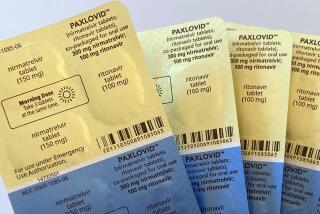Guidelines on AZT Use May Face Revisions : Research: New study questions whether AIDS drug prolongs life when taken early. But some experts insist it is an effective product.
- Share via
WASHINGTON — AIDS researchers grappled Wednesday with the difficult question of whether to change the guidelines that govern the use of the AIDS antiviral drug AZT in view of a major new study that casts doubt on whether the drug prolongs life when taken in the early stages of infection.
A federal advisory panel convened by the National Institute of Allergy and Infectious Diseases, scheduled to continue hearings through Friday, could issue new recommendations as early as this summer that would alter the drug’s use.
AZT, the most widely prescribed AIDS drug, is now recommended for patients who are infected with the human immunodeficiency virus that causes the syndrome but have not yet developed symptoms of disease.
More specifically, the drug is recommended for patients whose CD4 cells--the primary target of HIV--have fallen to 500 or below. A normal CD4 cell range is 800 to 1,000. Patients with fewer than 500 CD4 cells are more vulnerable to the opportunistic infections that ultimately kill people with AIDS.
Several important studies have shown that taking AZT after infection but before the onset of symptoms delays the progression of disease.
However, a major new study known as Concorde--so-called because it was conducted in France and Britain--casts doubt on the long-term benefits. Presented earlier this month at the international AIDS conference in Berlin, the study demonstrated that patients who received AZT early lived no longer than those who took it after becoming sick.
Despite those study results, several experts testified to the value of AZT.
“My personal opinion is that it is probably better to do something than not do something,” Dr. Douglas Richman, a UC San Diego AIDS researcher, told the panel. “I don’t think I’d sit around until I got sick.”
Dr. Paul Volberding, chief of the AIDS program at San Francisco General Hospital and the lead researcher on the original AZT studies that led to the current recommendations, agreed.
“I think AZT works,” he said.
Volberding said he would be inclined to continue recommending the drug for his asymptomatic patients, but only after informing them fully about the drug, including the results of the Concorde study.
“We obviously cannot ignore Concorde,” he said. “It is a very powerful study. The data speak for themselves. However, the results are not inconsistent with what our recommendations have been since 1989. There is a transient benefit. We have clearly seen that AZT prolongs the time to overt disease progression, although it doesn’t prolong survival.”
To decide whether to revise current treatment policy, researchers and clinicians will be forced to examine some elusive and scientifically unmeasurable issues, such as quality of life and drug toxicity.
Some researchers believe, for example, that AIDS patients who take AZT early--delaying the onset of illness--become much sicker and die sooner once they develop symptoms than those who waited to take AZT after their symptoms developed.
The panel deliberations also undoubtedly will be complicated by additional factors, among them, the drug’s side effects--a host of serious conditions including anemia, headaches and gastrointestinal disorders--as well as the existence of two other antiviral drugs.
Until now, AZT has been the first choice for patients who can medically tolerate it. Another, DDI, has been approved for patients who cannot take AZT; while a third, DDC, has been licensed for use only in combination with AZT. DDI can cause pancreatitis, and DDC can result in numbness or pain in the extremities.
Most researchers agree that none of the drugs represent a breakthrough in the treatment of AIDS, nor has it proved as effective as they would like.
However, the Concorde study has thrown accepted practice into confusion.
“Many of us would look at the Concorde trial and say it is consistent with what we’ve seen in other trials,” said Dr. Robert T. Schooley, a panel member who heads the infectious disease division of the University of Colorado health sciences center.
“But some would say: ‘why bother to treat?’ Others would say: ‘are we treating enough?’ ” Schooley added. “There is now a need to move to where we ought to be going--rather than where we’ve been.”






